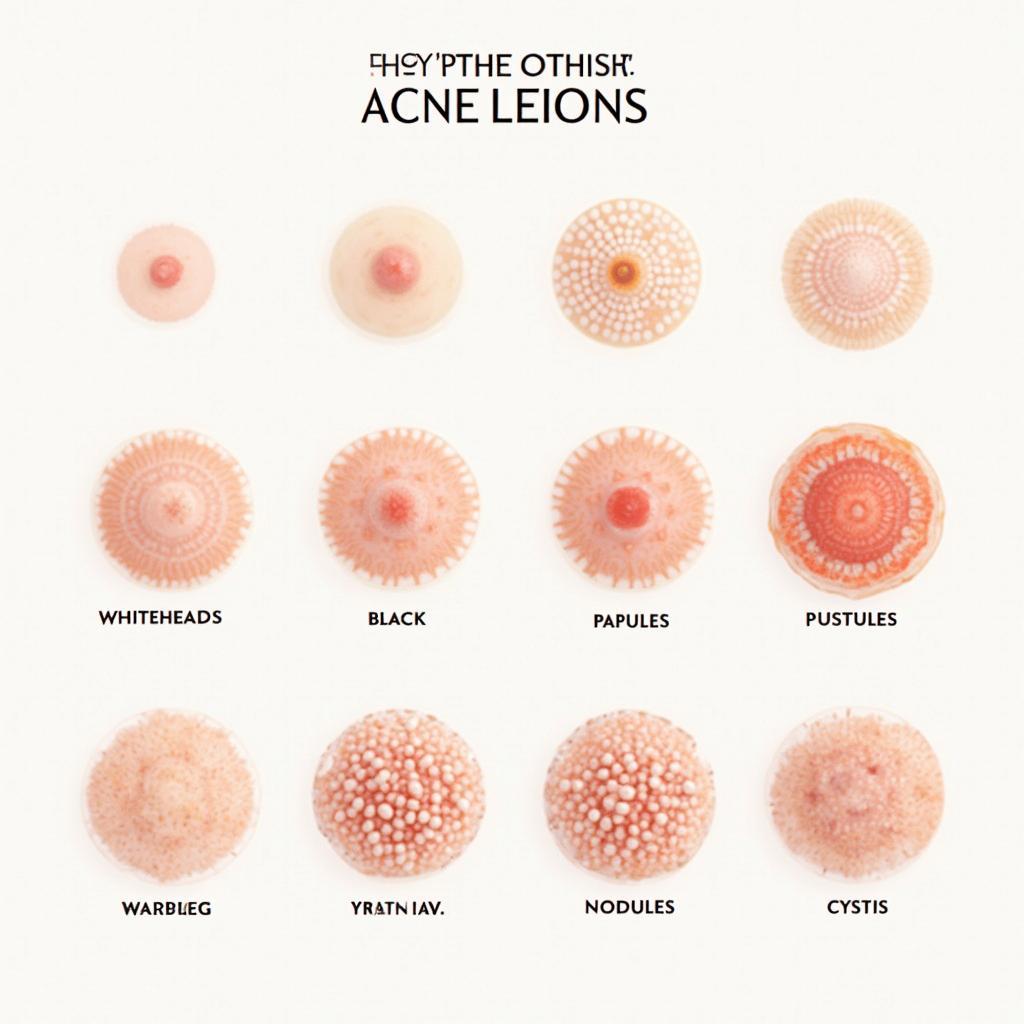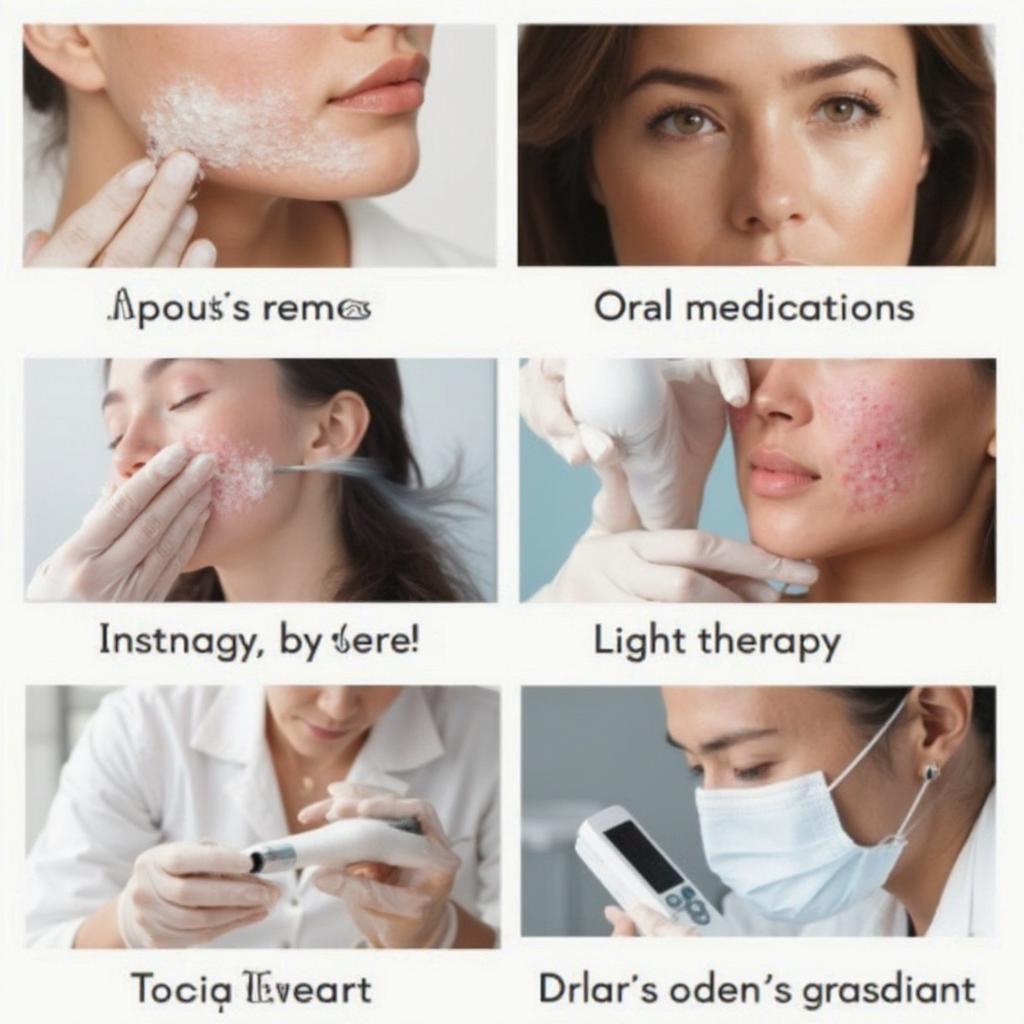Your cart is currently empty!

Types of Acne on the Face and Treatment (tipos de acne en la cara y tratamiento)
Acne, or acne vulgaris, affects millions worldwide. Understanding the different Tipos De Acne En La Cara Y Tratamiento (types of acne on the face and treatment) is the first step towards achieving clearer skin. This article will explore the various types of acne, their causes, and effective treatment options.
Understanding the Different Types of Acne (tipos de acne)
Acne lesions, commonly referred to as pimples or zits, vary in appearance and severity. Knowing the specific type of acne you’re dealing with allows for a more targeted and effective treatment approach. Here’s a breakdown of the common tipos de acne en la cara:
- Whiteheads (Closed Comedones): These are small, flesh-colored bumps that form when pores are clogged with sebum and dead skin cells. They appear white because the pore opening is closed.
- Blackheads (Open Comedones): Similar to whiteheads, blackheads are formed by clogged pores. However, the pore opening is exposed to air, causing the sebum to oxidize and turn black. It’s a myth that blackheads are caused by dirt.
- Papules: These are small, red, inflamed bumps that are tender to the touch. They are a sign of inflammation deeper within the skin.
- Pustules: These are similar to papules, but have a white or yellow pus-filled center. They indicate a more advanced stage of inflammation.
- Nodules: These are larger, solid, painful lumps that develop deep within the skin. They are often a sign of severe acne.
- Cysts: These are the most severe form of acne lesions. They are large, pus-filled lumps that are painful and can cause scarring.
 Different Types of Acne Lesions
Different Types of Acne Lesions
Causes of Acne
What causes these different types of acne? Several factors contribute to acne development:
- Excess Sebum Production: Overactive sebaceous glands produce too much oil, which can clog pores.
- Dead Skin Cells: The buildup of dead skin cells can also clog pores, leading to acne formation.
- Bacteria: Propionibacterium acnes (P. acnes) is a bacteria that thrives in clogged pores and contributes to inflammation.
- Hormonal Changes: Fluctuations in hormone levels, particularly during puberty, pregnancy, and menstruation, can trigger acne breakouts.
- Genetics: A family history of acne increases the likelihood of developing the condition.
Effective Treatment Options for Acne (tratamiento para el acne)
Fortunately, there are various effective tratamiento para el acne (treatments for acne) available. The best treatment approach depends on the type and severity of acne. Some common treatment options include:
- Topical Treatments: Over-the-counter and prescription creams, gels, and lotions containing ingredients like benzoyl peroxide, salicylic acid, and retinoids can help clear acne.
- Oral Medications: For more severe acne, oral antibiotics or isotretinoin may be prescribed.
- Light and Laser Therapies: These therapies can target acne-causing bacteria and reduce inflammation.
- Chemical Peels: Chemical peels can help exfoliate dead skin cells and unclog pores.
- Extractions: A dermatologist can safely extract blackheads and whiteheads.
 Various Acne Treatment Options
Various Acne Treatment Options
Finding the Right Treatment for Your Acne
What is the best treatment for different tipos de acne en la cara y tratamiento? Consulting with a dermatologist is essential for determining the most appropriate treatment plan for your specific needs. They can accurately diagnose your type of acne and recommend the most effective course of action.
“A personalized approach is crucial for successful acne treatment. What works for one person may not work for another,” says Dr. Emily Carter, a board-certified dermatologist.
Conclusion (tipos de acne en la cara y tratamiento)
Understanding the various tipos de acne en la cara y tratamiento empowers you to take control of your skin health. By recognizing the different types of acne and their causes, you can make informed decisions about your treatment and achieve clearer, healthier skin. Consulting with a dermatologist is crucial for developing a personalized treatment plan that addresses your specific needs.
FAQ
- What is the most common type of acne? Comedonal acne, characterized by blackheads and whiteheads, is the most common type.
- Can diet affect acne? While the link between diet and acne is still being researched, some studies suggest that high-glycemic foods and dairy may exacerbate acne.
- How can I prevent acne scars? Avoid picking or squeezing pimples, as this can increase the risk of scarring. Consult a dermatologist for treatment options to minimize scarring.
- How long does it take for acne treatment to work? Results can vary, but it typically takes several weeks to months to see significant improvement.
- Is acne contagious? No, acne is not contagious.
Common Acne Scenarios and Questions
- Teenage Acne: Hormonal changes during puberty often trigger acne breakouts.
- Adult Acne: Adult acne can be caused by various factors, including hormonal imbalances, stress, and certain medications.
- Acne During Pregnancy: Hormonal fluctuations during pregnancy can lead to acne flare-ups.
Further Reading
- [Link to article about hormonal acne]
- [Link to article about skincare routines for acne-prone skin]
If you need further assistance or would like to book a consultation, please contact us via WhatsApp: +1(641)206-8880, Email: [email protected] Or visit us at 456 Pine Avenue, Toronto, ON M5V 2J4, Canada. We have a 24/7 customer service team.

Leave a Reply